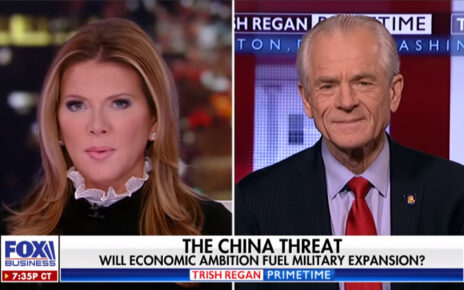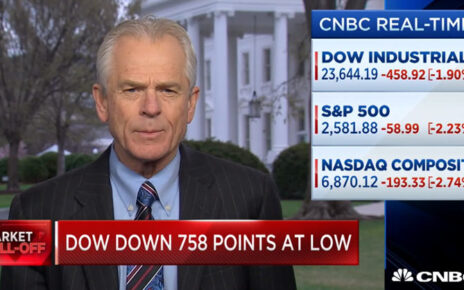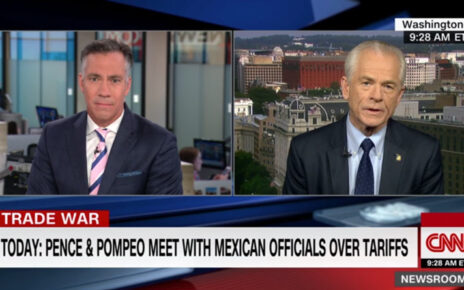October 2, 2018 – NPR, Morning Edition
RACHEL MARTIN, HOST:
President Trump says he wants to sign the new trade deal with Canada and Mexico by November. But he admits it won’t be an easy sell in Congress, which needs to ratify the agreement before it can become law. The new NAFTA has a new name. It’s called the U.S.-Mexico-Canada Agreement, or USMCA. And our next guest is one of the architects. Peter Navarro is a top trade adviser to the president and joins us now on the line.
Mr. Navarro, thanks so much for being back on the program.
PETER NAVARRO: Good morning, Ms. Martin. How are you?
MARTIN: I’m doing well, sir.
So the president has been able to check this box. I mean, he talked about this for many, many years – how he believed that NAFTA was not a good deal for American workers. He didn’t exactly rip up the NAFTA deal. A lot of the foundation is still there. But what do you believe are the most substantive changes?
NAVARRO: Well, he didn’t just check a box. He checked a Walmart big box of all boxes. I mean, this is a major achievement. Going back to 1994, this is a 24-year-old agreement. There’s two things that are different now. One, it modernizes the agreement. Back in the day, we didn’t have things like digital trade. We didn’t have things like biologics, which are complex pharmaceuticals. We have strong new disciplines and protections for that. So that’s a really good thing.
But the big thing, really, is what the trade representative likes to call restructuring. The old NAFTA, basically the Ross Perot giant sucking sound – it sent our jobs and factories offshore, turned what factories we had more into assembly plants rather than manufacturing. And there’s really strong incentives now with the domestic content rules and strong labor and environmental protections that keep those jobs here, keep the factories here. So…
MARTIN: Well, let me ask you about that. Auto manufacturing, in particular – the new agreement says 40 percent of a car’s content has to be built in places where workers earn at least $16 an hour. That may bring some manufacturing back to the U.S. But won’t it add costs that drive up car prices for consumers?
NAVARRO: So the full rules are 75 percent of the content has to be in the zone for the three countries. And then the higher wages make sure that the United States gets a good share of that. In terms of the price cost you raise, I think one of the lessons Americans have learned over the last 15 years of having countries like China dump heavily subsidized products into our markets is that there’s a very high cost to low prices. You lose your factories. You lose your jobs. You have stagnant wages. And you lose your technology as countries like China basically rip off our technology. So the…
MARTIN: So you’re willing to absorb that price hike. You think consumers can absorb it.
NAVARRO: Well, what will happen and what is happening in the Trump economy is we’re seeing more investment. Right now there are more jobs available than there are people to have those jobs, and wages are rising. This is a great thing for America. So yes, I believe everybody listening to this program would be more than happy to have higher wages and a secure job so that they can pay a few hundred bucks more for a car than the alternative 15 years we’ve had of artificially low prices, which are designed to move our factories and jobs and wealth offshore.
MARTIN: Let me ask you. You mentioned China. The new NAFTA agreement includes – and I’m quoting here – “protections against misappropriation of trade secrets, including by state-owned enterprises.” How much is this deal about targeting and isolating China?
NAVARRO: A small but important part. There’s provisions against state-owned enterprises. What China does, basically, is compete against companies around the world that are privately owned. And it’s not a fair fight. There’s a small section, as well, on currency manipulation, which China has historically been a part of. But the big deal here is that this is a good deal for manufacturing workers, particularly in the auto industry; it’s a good deal for farmers, particularly dairy farmers, chicken farmers, egg farmers and others, so we’ll have more exports there; and for innovators, the people who live in places like Silicon Valley and do physics and biologics. So it really – and by the way, buried the lead – it is the largest trade deal the U.S. ever has signed into. It’s a $1.2 trillion trade deal.
MARTIN: Can you get it through Congress? In just seconds remaining – can you get it through?
NAVARRO: Yes. Yes. After the election is over and we basically look at the deal, it’s great for labor. It’s great for business. It’s great for farmers. And it’s a very well-crafted deal. And the USTR Robert Lighthizer, Jared Kushner did a great job putting this together.
MARTIN: We’ll see if lawmakers on the Hill agree with you.
Peter Navarro, top White House adviser on trade, thanks so much as always. We appreciate it.
NAVARRO: You got it.



